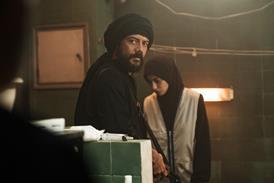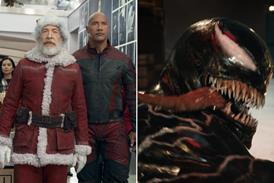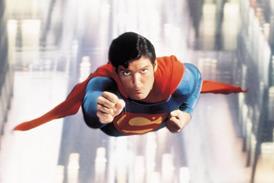What the stars and producer had to say about working with Lars Von Trier… and exactly what Shia LeBeouf said before storming off. [Full transcription]
At the photocall for the extended Nymphomaniac Vol 1 at the Berlin Film Festival, director Lars Von Trier gave photographers something to shoot when he revealed a t-shirt emblazoned with the Cannes palme and the words “Persona Non Grata” – referencing the controversy that he sparked at Cannes in 2011, which led to him withdrawing from public speaking.
But actor Shia LaBeouf managed to top that stunt by walking out of the press conference halfway through and later attending the world premiere of the film with a paper bag on his head with the words “I am not famous anymore” printed on the front – a phrase he has been tweeting for the past month.
His co-stars Uma Thurman, Stacy Martin, Stellan Skarsgard and Christian Slater made more interesting and less bizarre comments throughout the press conference alongside producer Louise Vesth. Here’s what they had to say…
What is the challenge of working with Lars Von Trier?
Stacey Martin: The biggest challenge for me was to be on my first film. Lars was very kind and very trusting so he made the job very easy. And to just have fun with it. If you’re going to do a film called Nymphomaniac, you have to.
Stellan Skarsgard: I’ve worked with him several times and I don’t think it’s very challenging working with him. It’s actually easier than with most directors and you have a lot more fun. It doesn’t even resemble work to me. Uma, what do you say?
Uma Thurman: One of the best days of my life.
Christian Slater: I loved it. It was an amazing experience. He was patience, gentle. He kept telling me to slow down which – coming from Hollywood – is very unusual. They always want things to move so quickly. It was nice to be on a set where there was some real time given to capture moments.
How close did you stick to the script?
Uma Thurman: For me, it was exactly scripted. Lars kept saying I was over-acting, but that’s nothing new. It’s my pleasure to do that. Lars wrote this fantastic monologue where this fury of a woman scorned enters this room and no-one else speaks – she just keeps talking. So it was a really great challenge to memorise seven pages of Lars’ female diatribe of rage.
Then, with the incredible way he shoots, I don’t how many minutes of it is left in the movie – I’m going to see it for the first time tonight – I’m so excited about what to expect from all of these wonderful people. It’s going to be so good.
But for me to do these 25 minute takes… I never did a movie, as Christian was pointing out… this woman comes and stands in the hallway and she waits. I wanted to go but he said: “Wait,” and he’s filming. “Oh, you’re going to film me waiting? Okay.” I’ve never done that before. It like filming me sleeping.
But it was unbelievably refreshing and lively and exciting to get to work and act in a way like theatre or for the first time on film because you never get that space. The whole thing was 25 minute takes, all day long. It’s quite muscular to do. It was great.
Stellan, were you aware you were the connecting element?
Stellan Skarsgard: I had read the script so I knew the function of my character but when you’re shooting, I was locked up for two weeks with Charlotte Gainsbourg in a room. Life can be a lot worse than that.
When you work with Lars, you try things and do whatever you want and it’s his job to put it together so you’re not too concerned about how he’s going to use it.
Were you aware there was so much humour?
Stellan Skarsgard: I knew it was very funny and Uma’s is one of the funniest scenes I’ve ever read. He’s a very funny man. You’ve got to learn to laugh at him a lot more.
What is the difference between the two cuts?
Louise Vesth: It’s the first volume that we show here at the Berlinale. We haven’t announced yet when we will show the second volume on the long version. You will have to wait and see.
Will it be in Cannes?
Louise Vesth: We don’t say that. I guess you all saw the t-shirt so I don’t know.
A question for Shia and Stacy. When you got involved in this project knowing there would be a lot of sex scenes, were you afraid it would be too much or were you completely confident in Lars Von Trier. A second question, there is a lot of talk about this film being about a Nymphomaniac. Do you think our societies are too conservative about sex in the movies?
[Shia gestures to Stacy]
Stacy Martin: I really trusted Lars and I’ve always really loved his films so the sex scenes for me were part of the film. I trusted Lars so immediately it makes the job much easier. I talked to Shia a bit before. It wasn’t like: “Oh hi, we’ve never met. Okay, let’s get naked.” No.
So there was a lot of discussion and preparation so at the end of the day you end up just actually wanting to start filming because there’s so much talk and so much worry around it that you’re just kind of sick of talking about it. You just want to do the scene to honour the film, to honour Lars and for me that’s what is important as an actress.
Shia LaBoeuf: When the seagulls… [take a big swig of water] follow the trawler it is because they think sardines will be thrown into the sea. Thank you very much. [Walks off stage]
How were you pushed out of your comfort zone?
Christian Slater: Oh, me? Obviously, the script is packed with a lot of, er…
Uma Thurman: Sardines! [laughs]
Christian Slater: Sardines! Yeah. Brilliant. I took the key, twisted it and all was revealed. One sardine after another. It quelled the fears and anxieties and I was fulfilled. There we go. There we go. [laughs]
The comfort zone. First of all, I hadn’t been on a set like this before where the director was in utter command of every department and I felt so completely safe in his hands. From the first moment I sat down and had dinner with Lars, I was in the actor comfort zone.
I felt him to be a very genuine person, very real. I could tell just by looking at him and talking to him that he had a very sensitive soul. For an actor that is the greatest gift – to get the opportunity to work with someone like that, who understands what it’s like to be an actor and to be put in sometimes uncomfortable, uncompromising situations and know that you’re there with someone who gets it and has a very kind heart.
Stacy Martin: I’ve talked too much already. You go.
Stellan Skarsgard: You talk about the actors comfort zone. Usually when you mention the comfort stain within the comfort zone it means you’re lazy as an actor and don’t take any risks. But the thing with Lars is that you feel really confortable and safe with him which makes it possible for you to take risks.
Christian Slater: You, kind of, want to do anything you can for him. Yeah. If he asks you to do something, you’ll do it.
It’s been said that women + sex = evil. Is Lars trying to show our own neurosis?
Stellan Skarsgard: It’s a question you should ask Lars, but he won’t answer it. But I don’t think he tries to tell you much. He doesn’t set out to send a message. I never heard that women and sex should be evil. I’ve found the most wonderful joy in sex with women.
One of the themes of the film is what are we allowed to say, what are we allowed to do and are we persecuted because of our thoughts, our wording, what language we use, our sex or if we live in a way than normal people that is the norm rather than the normal.
Define the artistic differences between the long version and the short version of the first volume.
Louise Vesth: You will have to see them to get the exact differences. It goes deeper into the discussion that Lars is taking in this film. It has a slower pace. If you have seen both, the sexual content is more explicit. It’s not another story. It’s all the material Lars wanted to use from his shooting so you will have a deeper feeling of the topics discussed in the film.
What does the Berlinale mean to you?
Stacy Martin: This is my first festival so I can’t answer that question.
Christian Slater: Look at this scarf [holds up Berlinale branded scarf]. What a festival! My pocket is full of little tiny bears. I’m thrilled to be here. I came here from Chicago and thought it would be freezing here as well but it’s very nice. The weather is beautiful and you guys are all here so it’s perfect.
Stellan Skarsgard: I love the Berlin Film Festival. It’s good to be back. And this is the first festival where it hasn’t been cold, rainy and windy.
Uma Thurman: This is my first time at the festival. Now there’s a festival everywhere in the world you can be proud that you’re one of the oldest.
Can you talk about the dynamic between Seligman and Jo.
Stellan Skarsgard: The two characters in that room are two sides of Lars Von Trier. One is the nerd side and that’s me. The other is multi-layered character and that’s Charlotte. It’s not a simple representation but I’m a unich, asexual and she’s the opposite. But I’s not realism we’re dealing with. You don’t attack the roles like ones not in a fairytale. All Lars films are fairytales. You have to adapt to his universe.
What were your thoughts on reading the script. Were you nervous?
Stacy Martin: I wasn’t nervous. I had nothing to lose, it being my first film. I’d never read a script but his was insightful and fascinating. It made me believe in great directors. I had to jump on the train. The nervousness was more technical. The story itself didn’t make me feel nervous.
Why is the story of a nymphomaniac interesting to an audience?
Stacy Martin: Why not? Lars creates great conversations and debate around things that we might not feel completely comfortable talking about. Our sexuality is who we are so why deny it. It’s just Lars. You have to watch his films.
Can Lars do anything he wants do you face restrictions?
Louise Vesth: He has done what he wanted till now so let’s hope it continues. With sex it made it more difficult. Because of public rules. Sex is more difficult than violence. I don’t know why but it is. But we have until now been able to do all the films he wanted and thank god for that.

























No comments yet